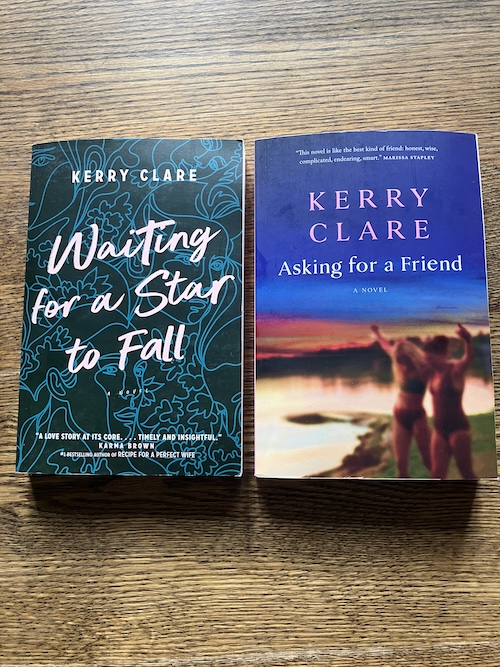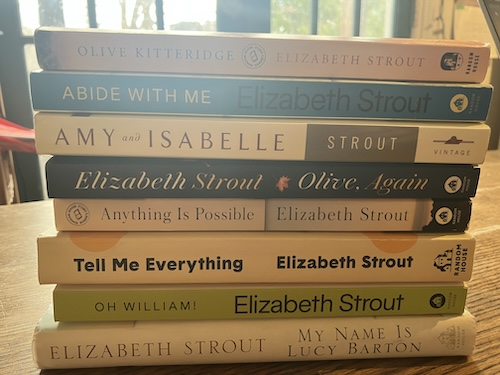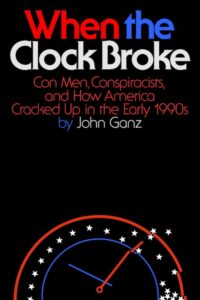February 5, 2025
It Must Be Beautiful to Be Finished, by Kate Gies
Before her second surgery at age five (there would be 14 surgeries in total), Kate Gies had learned to somersault, somersaulting becoming her preferred mode of transport at home: “Bend, tuck head to chest, pull forward, and roll! Like a wheel!” But after the surgery—during which a plastic ear was inserted under grafted skin; Gies was born without a right ear and this replacement would be cosmetic only—she would experience pain from motion as simple as moving her head to one side in her sleep, so there would be no more somersaults. The plastic ear wouldn’t take either, and doctors’ further attempts to deliver on promises of building her ear would be far from straightforward, until finally—at age 14—Gies put a stop to all of it, deciding she preferred living in her body as it was, rather than trying to have two ears, rather than trying to be what she calls, “The Kate I’m Supposed to Be.”
Although that is not the end of the story, the trajectory not so simple, not least of all because Gies is hearing impaired (she has no hearing where she has no ear [obviously!], and her hearing on the other side was compromised following a punctured eardrum from one of many surgeries gone wrong), but spends the next 20 years not considering her disability and the need for accommodation. Instead, “[m]y problem had always been perceived as the physical deformity of the missing ear. Its form was the problem, not its function: what I looked like, not the ease with which I took in an navigated the world.”
The catalyst for Gies’ memoir, IT MUST BE BEAUTIFUL TO BE FINISHED, is the discovery of a lesion on her right earlobe, the earlobe constructed from tissue from her stomach during those childhood surgeries, the ear that she never thinks about, doesn’t touch, disassociated from this part of her body, and still traumatized from the brutal medical procedures she’d suffered during the years doctors spent trying to make her complete. The memoir documents her movement toward finally the facing the reality of her body and of her history full, a journey told in vignettes and fragments from the past.
The fragmented structure of the memoir is emotionally helpful for the reader, because reading it is such a visceral and wrenching experience, and the story in pieces makes that easier. It’s also how memory works, flashes and splinters, and Gies’s memoir is a fascinating exercise in reconstructing history too, the writing including excerpts from her medical records and also feedback from Gies’s mother upon hearing what she’d written, offering corrections and extra insight, her own pivotal point of view. (Gies recalls her mother being extra cheerful before her surgeries at The Hospital for Sick Children in Toronto; her mother tells her how once Gies had been delivered to surgery, she’d have to find a place to cry.)
In addition to Gies herself, who appears to have been born with her somersaulting spirit fully formed, her mother emerges as the hero of this book, standing up for her daughter within a system that offered them very little agency, setting the kind of example that likely empowered Gies to eventually declare herself finished with surgeries—a decision her mother never questioned. Their back-and-forths are one of the most moving parts of this book, her mother’s honest self-criticism, Gies’ generosity in imagining herself into her mother’s perspective in the most stunning and powerful fashion. (I think it was because I was able to relate so strongly to both characters that I found reading this book so incredibly moving, in a way that was sometimes painful, but also a gorgeous testament to what writing can do.)
In telling the story of her own experience in an ableist and misogynist medical system, Gies illuminates broader truths about what it means to have a body, to live with difference, and learn to finally feel at home within one’s skin. I loved this book so much.
February 4, 2025
Talking Politics

I’m so proud to have published these two unabashedly political novels, grateful for every instance in which those novels have been received in that context, and still a little bit disappointed that it hasn’t happened more often, because making these issues and ideas—about consent, and power, and reproductive rights—accessible to readers was huge part of why I wrote these books in the first place. It’s disappointing to me that “politics” is so often seen as siloed, male, serious and tidy, dry and impersonal, detached from our bodies, our families, the hamster wheels of our everyday lives.
At this moment where politics as usual has seemingly jumped the shark, however, I feel heartened by two really beautiful instances of these novels entering the discourse. On the January 28 episode of the Aborsh podcast, Elizabeth Renzetti (whose new book WHAT SHE SAID: is essential reading) mentions ASKING FOR A FRIEND as an example of positive abortion representation in media (along with SEX AND THE CITY!): “[The book] starts with an abortion and it’s about how that abortion shapes, the friendship between the two protagonists. And it’s just a really interesting way of looking at how abortion brings the two women together and becomes a shared experience.”
And WAITING FOR A STAR TO FALL will be the BEYOND A BALLOT Book Club pick for February 27, which I’m really looking forward to. BEYOND A BALLOT, whose mission is to get more Canadian women interested in politics, brings together really interested group of politically-minded thinkers, and I hope that my novel makes for fruitful discussion and meaningful questions (which are always more important than having the answers).
February 4, 2025
Olive Kitteridge and #WinterofStrout

As I wrote about in my January essay, 2025 is my #WinterofStrout, a project that was born by a comment a friend made in our group chat when we were once again marvelling about Elizabeth Strout’s Lucy Barton books, a proposal to (re)read them all, which I thought seemed like such a fantastic idea, mostly because there are many books by Strout I still had yet to read AND my initial encounters with her books had been such MISreadings. I first read Olive Kitteridge in 2013, and enjoyed it, but had avoided it for years before that thinking it was hokey and middlebrow, and in some ways I wasn’t even wrong, and I certainly wasn’t moved enough by it to pick up Strout’s 2019 follow-up Olive, Again, although that was probably because I’d read another novel by her, My Name is Lucy Barton, in 2016, and been so extraordinarily unmoved (and even desirous of my money back—the book seemed slight, unfinished, not enough).
I also didn’t properly understand how both books could be by the same author, or just who this Elizabeth Strout person was anyway, who invented characters with definitive names that usurped her own in reader consciousness. Not thinking very much about any of it at all, until I went back to Lucy in 2023 and found myself besotted. In some ways, still, My Name is Lucy Barton was not enough, okay (though I could make a good argument against that now, especially having seen it performed as a one woman show), but in connection with Strout’s other works—both those books with Lucy’s voice at the centre and others—there is so much life going on. “Strout’s books are less an exercise in narrative than one of character, and its variable layers, and the connections between them, and between places, ideas, and things.”
I love a reading project, the way these books give shape, structure, and context to my own ordinary experiences. My #WinterofStrout began with her debut novel, Amy & Isabelle, which I read in December and completely enjoyed, impressed by how Elizabeth Strout was Elizabeth Strout right out of the gate, fully formed, and thinking about that line from Lucy Barton about how everyone has just one story, really, and they keep telling it over and over, and that Strout’s for certain is mothers and daughters, mothers and daughters. Although this was less apparent in her second novel, Abide With Me, which read on Christmas Eve, this one a story about a father, a widower, whose troubled daughter would grow up to be Bob Burgess’s friend, social worker friend Katherine Caskey, who shows up in later Strout novels. Abide With Me is a novel about marriage, faith, despair, about the failures of community, about the unknowability of others’ experiences (which perhaps is Strout’s actual one story). About the spots of goodness that save us, the miracle of that in a world where so much is otherwise.
And then it was time for Olive Kitteridge, which I’d really been looking forward to, supposing that re-encountering that book in the broader context of Strout’s work would be fascinating—it won the Pulitzer Prize after all. I was prepared to be dazzled. And reader, I was not. Which is not to say that I didn’t love the book, that I didn’t see all the richness that was there, that I didn’t find the stories in the collection so extraordinarily moving. I did! I did! Everything I love about Strout’s point of view and her fascinations and preoccupations are perfectly on display here, but, I’d had this idea of Strout as an author who “doesn’t write novels so much as chart constellations, connecting points of light, moments of grace.” And really was quite sure that this skill would be on full display in this “novel in stories,” and I’d be able to understand her method better than when I first read the book so many years ago.
But it would turn out that Olive Kitteridge really is, as opposed to a chart of constellations, a short story collection, and not even “a novel in stories,” which Olive does not actually purport to be on my copy, but a collection of stories almost half of which had been published in various places between 1992 and 2007 (and it’s likely I even read that earliest story in its initial publication because it was published in Seventeen, which I was an avid reader at the time). Likely Olive herself was not even present in many of the stories’ original incarnations, the ones in which Olive exists in the background, but added as Strout put the Olive Kitteridge manuscript together, which is fine, but it’s just that I’d been expecting something more organic, something more like the magic of what happens when I meet Isabelle from Amy and Isabelle in the pages of Strout’s latest novel, Tell Me Everything, but again, that’s an awful lot to ask from a book.
February 3, 2025
When the Clock Broke, by John Ganz
Today I am nostalgic for last week, when I was delightfully ensconced within the pages of John Ganz’s When the Clock Broke: Con Men, Conspiracists, and How America Cracked Up in the Early 1990s, an utterly whackadoodle story that begins with a chapter called “Swamp Creature,” about the bizarre politics of Louisiana stretching back to Napoleon, that state’s curious combination of anarchy and tyranny under figures like Huey Long, and from where David Duke emerges, freaky weirdo and KKK aficionado, in 1989 finishing first in an open primary for Louisiana’s 81st district, and would go on to serve in that state’s legislature.
Ostensibly, Ganz’s book documents the 1992 US Presidential election and its primaries (in which Duke would take part and be out of the running very early), beginning with Duke in Louisiana, finishing 300-some pages later in New York City in 1992 as crime boss John Gotti is convicted, a former state attorney named Rudolph Giuliani having brought down many prominent Mafia figures in that state—and yet all is not well, and the myth of Gotti continues to hold appeal. Americans are mistrustful of institutions, and for good reason—a decade of Reaganism has failed to benefit most families, deregulation has led to banks defaulting, a widespread recession, the rise of talk radio filling social gaps but leading to polarization, free trade seemingly taking away US jobs, police violence and devastating riots under an incredibly corrupt LAPD inflaming racial tensions, similar tensions between stoked between African-American and Jewish communities in New York City, and dividing allies on the left, not to mention the Ruby Ridge Standoff (during the which a N*zi salute is construed as an enthusiastic gesture, lest you think anything has ever been new), the Branch Davidian Siege in Waco, Texas, and other instances of extremism getting closer and closer to the American mainstream. Well known figures like Pat Buchanan and Ross Perot (who brings a Musk-ish energy to the scene) enter the chat here, two figures whose ubiquity at the time maybe undermined their strangeness, but man, they were strange, and they were only the tip of an iceberg of “paleoconservativism,” the moment that maintained that the problem with Nixon and Reagan is that they did not go far enough.
Ganz’s narrative moves at a swift pace, rich and sweeping, sparkling with memorable sentences (of Louisinana governor Edwin Edwards, he writes, “He was still a “Laissez les bons temps rouler” guy in the laissez-faire world of Reaganomics and austerity. He have have laissez-ed a little too bon of a temps.”) There is something comforting about the bonkers world he depicts, the way it gives our current moment essential context, how much less dangerous these forces are at the remove of history—and of course they were less dangerous then, still on the fringes.
But not as much on the fringes as I would have imagined. I wasn’t very old when all these events are taking place, but I remember them, their cast of characters, watching it stream on CNN, and how ordinary it all seemed from my vantage point. But that’s the way of course, how the path is laid, one thing leading to another, and the power of Ganz’s storytelling is that he doesn’t even need to make explicit the connections, the story does it for him. Donald Trump is a minor character throughout the whole book, but his presence looms large from his first appearance on page 41 when he shows on ABC News’ Primetime Live after in November 1989 just after David Duke does, Trump “ranting about Japanese investment on the US economy, under the headline, ‘Who Owns America?'”‘”







